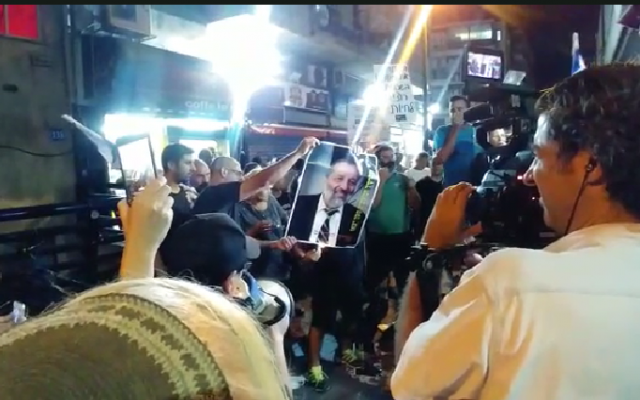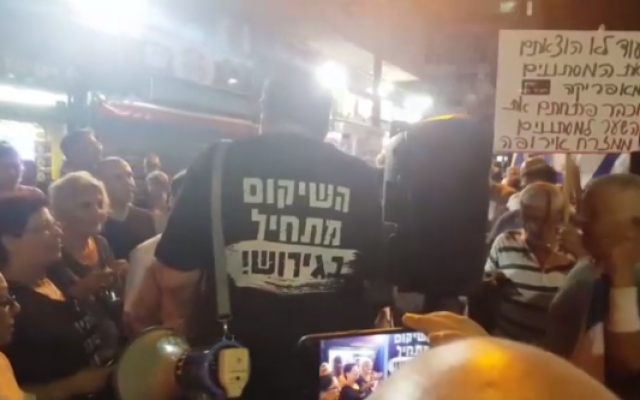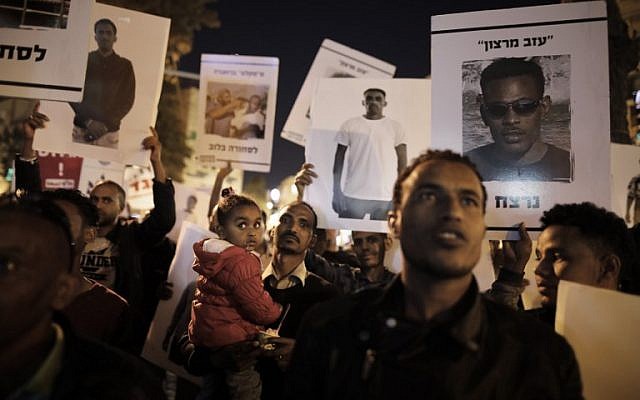Angry demonstrators in city’s impoverished south rail at Aryeh Deri, chase away Jewish Home MK Bezalel Smotrich

Protesters at a southern Tel Aviv demonstration against African asylum seekers burned photographs of Interior Minister Aryeh Deri, the minister responsible for overseeing the country’s refugee policy.
Some 300 people took part in the protest, expressing anger at the government’s seeming inability to remove tens of thousands of asylum seekers from the impoverished neighborhoods.
The protesters railed against politicians, including those on the far-right who have publicly supported them in the past. Jewish Home MK Betzalel Smotrich visited the protest, but was driven off with angry shouts from the demonstrators.
One protester held up a sign addressed to Prime Minister Benjamin Netanyahu that read, “Bibi, keep your promise.” Netanyahu visited the area last year and vowed to solve the problem, but no government framework has yet been put forward.
The event was held on Levinsky Street, which connects the Florentin neighborhood of southern Tel Aviv with the city’s dilapidated central bus station area.

One Hebrew-language sign held up by a protester read, “Not a refugee, not desperate, just a squatter and infiltrator.” Many in attendance wore shirts with slogans including, “The South Tel Aviv Liberation Front” and “Rehabilitation [of Tel Aviv’s slums] Begins With Expulsion [of asylum seekers].”
In recent years, the estimated 35,000 African migrants in Israel have been detained, threatened with deportation, and faced hostility from lawmakers and residents. Since last year, they face another burden: a de facto 20 percent salary cut that has driven them further into poverty.
The Africans, mainly from war-torn Sudan and dictatorial Eritrea, began arriving in Israel in 2005 through its porous border with Egypt, after Egyptian forces violently quashed a refugee demonstration in Cairo and word spread of safety and job opportunities in Israel. Tens of thousands crossed the desert border, often after enduring dangerous journeys, before Israel completed a barrier in 2012 that stopped the influx.

Since then, Israel has wrestled with how to cope with those already in the country. Many took up menial jobs in hotels and restaurants, and thousands settled in southern Tel Aviv, where Israeli residents began complaining of rising crime.
While the migrants say they are refugees fleeing conflict or persecution, Israel views them as job-seekers who threaten the Jewish character of the state.
Israel has gone from detaining them in remote desert prisons to reaching a deal with a third country, believed to be Rwanda, to have them deported there.
In April, Israel reached an agreement with the United Nations to have roughly half of the migrants resettled in Western countries, with others allowed to stay in Israel. But the government quickly scrapped the deal after an outcry by right-wing politicians and residents of the hardscrabble areas where many of the migrants live.
The measures have kept the migrants living in limbo. The overwhelming majority have not been granted asylum and they lead a tenuous existence.
As reported by The Times of Israel
